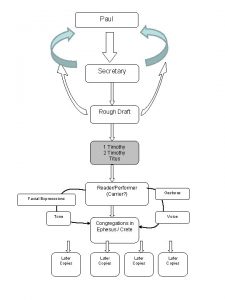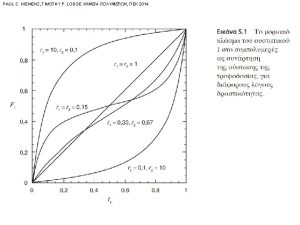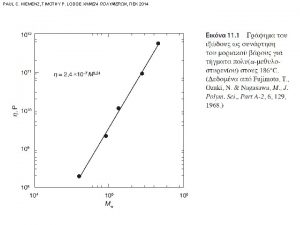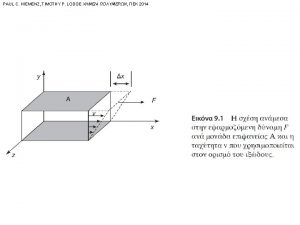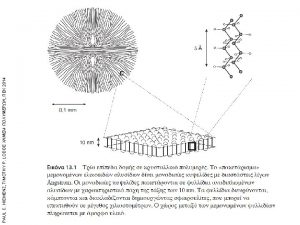The Second Letter Of St Paul To Timothy






















- Slides: 22

The Second Letter Of St. Paul To Timothy

Introduction Authorship n St. Paul (2 Tim 1: 1) Recipient n St. Timothy the Bishop of Ephesus (1: 2) Date n During second imprisonment (66– 67)

Purpose § To encourage Timothy to: § To stand strong in the grace that is in Christ Jesus (2: 1) § To commit to others what St. Paul had taught him (2: 2, 14) § To preach the Word! (4: 1) § To endure hardship and afflictions (2: 3; 4: 5) § To fulfill his ministry as an evangelist (4: 5)

Theme n Fulfill your ministry (4: 5) Outline Chapter 1: Encouragement from a Faithful Apostle n Chapter 2: Characteristics of a Faithful Bishop n Chapter 3: Commands for a Faithful Bishop n Chapter 4: The Hope of a Faithful Apostle n

Greetings (2 Tim 1: 1, 2) n According to the promise of life: St. Paul’s apostleship is in order to carry into effect this promise. n This “promise of life in Christ” was needed to give Timothy strength amidst trials, and boldness to go to Rome, which was risky (2 Tim 1: 8).

Greetings (2 Tim 1: 1, 2) n St. Paul instructs Timothy as his father n St. Paul shows love and affection to his spiritual sons n He also is praying for his spiritual sons n He is asking for them: grace, mercy, and peace from God. All of us need these three gifts.

Encouragement to Persevere (2 Tim 1: 3 -7) n From my forefathers: as my forefathers served Him. n Although St. Paul was a Jew, but accepting Christ is the following of the hereditary faith. n He is using this to encourage Timothy to stand firm in the faith that he received from his mother and grandmother. n Is it right to leave our children to choose their faith?

Encouragement to Persevere (2 Tim 1: 3 -7) n The cause of Paul feeling thankful is, not that he remembers Timothy unceasingly in his prayers, but for what Timothy is in faith (2 Tim 1: 5) n “As for me, far be it from me that I should sin against the Lord in ceasing to pray for you” (1 Sam 12: 23)

Encouragement to Persevere (2 Tim 1: 3 -7) n He desired to see him because: – Of Timothy’s tears – In order to be filled with joy – The sincere faith in Timothy n In order for the faith to dwell in the children, it has to dwell first in the parents (2 Tim 3: 15).

Encouragement to Persevere (2 Tim 1: 3 -7) n Because of what you inherited, be faithful and stir up the gift of God. n The ordination is more than a blessing. With it comes responsibility and accountability. n The ordination is a gift of God given through the laying on of the bishop’s hand.

Encouragement to Persevere (2 Tim 1: 3 -7) In ordination, God does not give us the spirit of fear, weakness, and timidity but the spirit of power (Acts 1: 8). n Spirit of love moves the minister while speaking the truth with power, speaks it in love, too (Eph 4: 15). n Love casts out fear (1 John 4: 18). n Sound Mind: a duty to which a young man like Timothy especially needed to be exhorted to give up worldly entanglements, which as thorns choke the word. n

The Shameless Confidence (2 Tim 1: 8 -12) n Seeing that God has given us such a spirit, not that of fear, do not be ashamed of the testimony of God or His prisoner, St. Paul. n Shame is the companion of fear. n Many were ashamed of St. Paul, so he is encouraging Timothy not to be one of them. n Partake in afflictions for the gospel according to the power of God that saved us (2 Tim 1: 9).

The Shameless Confidence (2 Tim 1: 8 -12) n Think not that you have to bear these afflictions by your own power; no, it is by the power of God. It was a greater exercise of power than His making the heaven, His persuading the world to embrace salvation [Chrysostom]. n The Father called us to live a holy life.

The Shameless Confidence (2 Tim 1: 8 -12) n The having “saved us” in His eternal purpose of “grace, given us in Christ before the world began, ” precedes his actual “calling” of us in due time with a call made effective to us by the Holy Spirit. n This grace became manifest through the incarnation of the Son.

The Shameless Confidence (2 Tim 1: 8 -12) n Abolished death: taken away the power from death. n Brought to light: making visible by the Gospel what was before hidden in God’s purpose. n Life: of the Spirit, acting first on the soul here, about to act on the body also at the resurrection. n Immortality: incorruptibility of the new life, not merely of the risen body.

The Shameless Confidence (2 Tim 1: 8 -12) n He brings forward his own example in verses 11 and 12, as a pattern for Timothy, as: – A public preacher of the Gospel – Apostle or missionary from place to place – Teacher in private instructing His flock with patient perseverance

The Shameless Confidence (2 Tim 1: 8 -12) n Besides my active work as an apostle, I suffer even being a prisoner and I am not ashamed either because: – I know what a faithful, promise-keeping God He is. – He is able, in spite of so many foes around me, to keep that which I have committed unto Him, i. e. “my deposit”; the body, soul, and spirit, which I have deposited in God’s safe keeping

Keep Going (2 Tim 1: 13 -18) n In faith (beliefs) and love (behavior) n We are able to keep the sound words in faith and love only by the Holy Spirit that is in the believers. n Asia: all who are there now because they were ashamed of St. Paul when they were in Rome. n A hint to Timothy, now in Asia, not to be like them, but to imitate rather Onesiphorus, and to come to him

Keep Going (2 Tim 1: 13 -18) n Phygellus and Hermogenes: specified perhaps, as being persons from whom such conduct could least be expected; or, as being well-known to Timothy, and spoken of before in conversations between him and St. Paul, when the latter was in Asia Minor. n God blesses not only the righteous man himself, but all his household.

Keep Going (2 Tim 1: 13 -18) n St. Paul in the second, as in his first imprisonment, was bound by a chain to the soldier who guarded him. n Found me: in the crowded city; Rome. So in turn “may he find mercy of the Lord in that day” when the whole universe shall be assembled.

Keep Going (2 Tim 1: 13 -18) n Why do we pray for the dead? – Biblical teaching – It is a communion of love (we pray for the saints) – Forgiveness of sins – Rest and repose to their souls

Conclusion What things does St. Paul tell Timothy not to be ashamed of? n Why might he have been ashamed? n What problems arise from being afraid of what people think of you? n How might your spiritual maturity and fruitfulness by affected by such fears? n What benefits can you receive by not being afraid of what people think of you? n
 Paul's second letter to timothy
Paul's second letter to timothy Letter of st paul to timothy
Letter of st paul to timothy Paul's letter to timothy on leadership
Paul's letter to timothy on leadership Second timothy 2 15
Second timothy 2 15 Timothy p. schmalz
Timothy p. schmalz Paul to timothy encouragement
Paul to timothy encouragement Sky grass and root letters pdf
Sky grass and root letters pdf 27 miles per gallon into kilometers per liter
27 miles per gallon into kilometers per liter Acts 21 map
Acts 21 map Map of corinthians
Map of corinthians St paul's letter to the galatians
St paul's letter to the galatians St paul's letter to the galatians
St paul's letter to the galatians Author of the book of romans
Author of the book of romans Letter of saint paul to the philippians
Letter of saint paul to the philippians Letter of st paul to the ephesians chapter 4
Letter of st paul to the ephesians chapter 4 Letter of st paul to the philippians
Letter of st paul to the philippians Letter of st paul to the colossians
Letter of st paul to the colossians Hình ảnh bộ gõ cơ thể búng tay
Hình ảnh bộ gõ cơ thể búng tay Ng-html
Ng-html Bổ thể
Bổ thể Tỉ lệ cơ thể trẻ em
Tỉ lệ cơ thể trẻ em Chó sói
Chó sói Thang điểm glasgow
Thang điểm glasgow

































